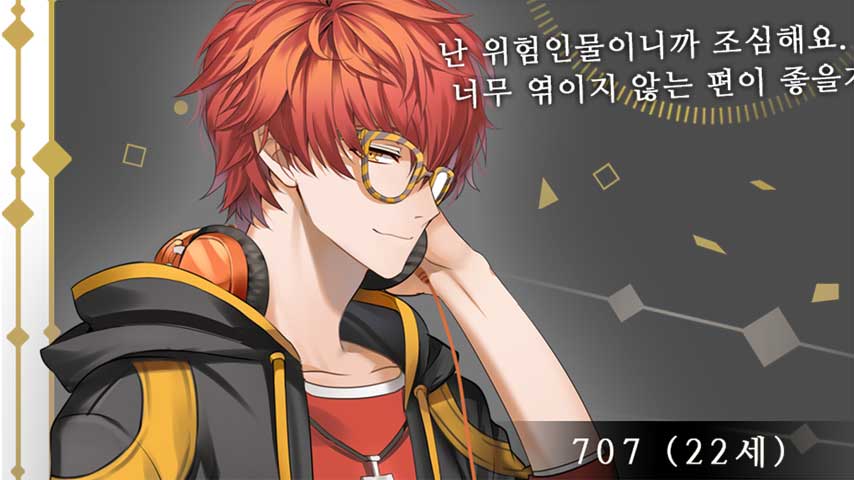I’ve always been pretty good at finding silver linings in terrible situations, and the Covid-19 crisis has been no exception. When they announced that the preschool I teach at was closing for at least two weeks, I gathered my things together, bid a temporary farewell to the children and my coworkers, and downloaded Mystic Messenger to my phone.
When the game first came out in English two and a half years ago, it seemed everyone I knew with an even passing interest in visual novels was playing it. They talked about its innovative gameplay style, eleven days of text message conversations that play out in real time, and how they even rearranged their sleep schedules to accommodate it. To me, it sounded like an engaging, fun experience that was completely inaccessible to people with jobs like mine.
After two years saying, “I’d love to play Mystic Messenger, but…” my time has finally come.
I didn’t know much about the story of the game; I really only knew about its format. I found myself locked in a stranger’s apartment and thrust into the role of managing the guest list for a charity party thrown by the RFA, a fundraising association with six members that has all but disbanded since their leader, Rika, passed away a year and a half ago.

I got to know RFA’s five main members – college gamer Yoosung, up-and-coming actor Zen, hacker Seven, corporate overlord Jumin, and his beleaguered assistant Jaehee – over the next couple weeks, sneaking in chats between hosting conference calls for four-year-olds and researching activities to email to parents. I opted to focus my attention on the overworked and under-rested Jaehee, because solidarity between working women in the face of uncaring men resonated with me the most out of the three casual mode choices. As I texted with Jaehee, encouraging her to follow her passions and rest despite Jumin’s uncompromising demands of her, I began to sense a peculiar confluence between the world of the game and the real world outside.
Social distancing – the buzzword of the day. It’s converted classrooms into distance learning, table service restaurants into takeout counters, and face-to-face relationships into virtual ones carried out through texting and chat programs. All over the world, people are restricted to their living spaces, with the internet as their only source of social contact. We offer support to each other virtually, limited as we are by fear of infection.
It doesn’t feel so different from texting with Jaehee, listening attentively to her work woes and offering her words of comfort and encouragement. After all, the people in fields deemed essential service – grocery stores, pharmacies, and of course the incredibly courageous medical workers – are working harder than ever. Strikes are popping up all over the US as the public realizes just how important their labor is. Jaehee’s own small rebellion of pursuing a project she feels passionate about rather than the vanity project Jumin demands of her echoes the struggle of workers whose labor have always been taken for granted, even if it lacks the potentially earth-shaking consequences.

As Jaehee and I grew closer, along with the rest of the members of RFA, she began to talk about her plans for once we meet, and how excited she would be to see me at the party. Because of the circumstances of how I joined the RFA, lured in by a stranger, I’m isolated from the other members for the time being. We know there will be an end to this situation, and that in not too long, we’ll be able to see each other face-to-face and laugh together and touch one another.
And I know that, here in reality, social distancing will end one day. There’s no stop date, unlike in Mystic Messenger, but something will change. Perhaps the curve will be sufficiently flattened, or a vaccine will be developed, or something else, and we’ll all be free to spend time together and embrace, just as we did before. I’ll see my friends, and we’ll hug and spend time together. I’ve been spending a lot of time thinking and talking about what I want to do with them once this is all over, and I know I’m not alone.

Just like, within the construct of the game, I was able to have a face-to-face and heart-to-heart conversation with Jaehee at the party, I’ll finally get to see my family and friends again. We talk about what we want to do when this is all over: bonfires at the beach, dinner parties, meeting up at the conventions that had to be canceled for the year. Mystic Messenger and real life both carry a sense of anticipation to them, an acknowledgement that the holding pattern we’ve been forced into is only temporary.
Reality and fiction often play together in strange ways, and old media gains new relevance and interpretations as our lives and the world around us changes. There’s no way Cheritz could have realized a global pandemic would lock much of the global population away when they developed this game four years ago, but the resonance between protagonist’s isolation and relationships enabled by technology and the realities of social distancing and the Covid-19 pandemic remains. Our connections, whether they be face-to-face or virtual, bring us comfort and support in trying times. As difficult and sad things are now, I’m glad I got the chance to get to know Jaehee, Zen, Seven, and Yoosung.
The post Mystic Messenger shows how important digital bonds are during social distancing appeared first on VG247.
from VG247 https://ift.tt/39yHNBi

No comments:
Post a Comment